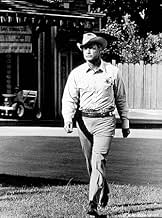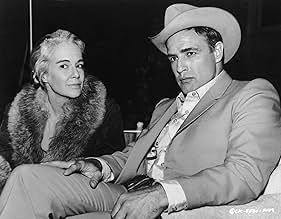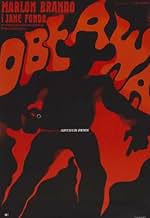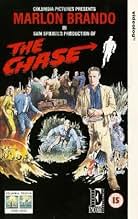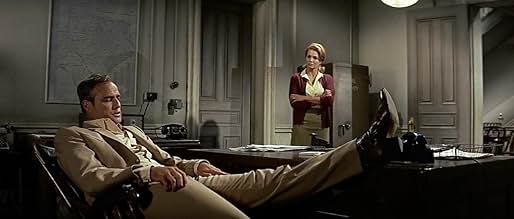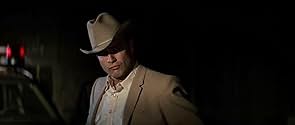The citizens of a small Texas town become worried and panicked when a local bad boy escapes prison and heads for his hometown.The citizens of a small Texas town become worried and panicked when a local bad boy escapes prison and heads for his hometown.The citizens of a small Texas town become worried and panicked when a local bad boy escapes prison and heads for his hometown.
- Awards
- 1 win total
Marc Seaton
- Paul
- (as Marc Skaton)
Featured reviews
A town in the southern United States is presented as a kind of microcosm in which hypocrisy, class struggle, lust, the cult of power and money, jealousy, but also dignity, common to all societies, coexist. As the minutes go by, the townspeople become increasingly brutalized and debased, on a Saturday night that will end in tragedy. Robert Reford's character is a born loser, who has escaped from prison and returns to the only place he knows, his hometown, where his wife Jane Fonda lives, or his parents, rude people who have not given him the affection necessary to make him a worthwhile man. Marlon Brandon and his spouse Angie Dickinson, they are without a doubt the most humane couple in that 'wretched' town. The direction is sublime, with no concessions to any kind of unneeded 'joy'.
I was interested to watch 'The Chase' for three reasons. First Brando. Brando is regarded by most movie fans as one of the greatest actors of all time, but people usually only mention a handful of his films - 'A Street Car Named Desire', 'On The Waterfront', 'The Godfather', 'Last Tango In Paris' and 'Apocalypse Now'. Without a doubt they are all fine movies but what about his equally worthy performances in his lesser known films (e.g. 'One-Eyed Jacks', and 'Burn!')? Secondly, Arthur Penn. An extremely underrated director in my opinion, especially for his almost forgotten 'Mickey One' and 'Night Moves'. Thirdly, the first rate supporting cast which includes Robert Redford, Robert Duvall, E.G. Marshall, James Fox, Jane Fonda, Angie Dickinson and Clifton James. Apparently there were lots of behind the scenes problems with this movie, but despite a few flaws it's definitely worth watching. The sexual and racial themes were pretty daring for the mid-60s, and while I can see what some people are saying about its "soap" feel, it's quite compelling. Brando plays a small town farmer turned sheriff who is despised by many of his contemporaries because they think he is the puppet of the local millionaire Val Rogers (Marshall). Rogers' son Jake (Fox) is having an affair with a local woman (Fonda) who is married to a convict Bubba Reeves (Redford). Bubba escapes from prison and an innocent bystander is killed by his fellow escapee. Bubba initially plans on heading to Mexico, but he desperately returns to his home town for help, not realizing that he is being hunted as a murderer. News of his escape causes tensions to explode in the town, with catastrophic results for everyone. Brando is terrific throughout, and reason enough to watch this, but Fonda is surprisingly good, Robert Duvall is memorable as a cuckold, and character actor Clifton James ('Cool Hand Luke', 'Live And Let Die', 'The Last Detail') almost steals the movie as a hot headed drunken redneck. 'The Chase' may not be as great as it could have been, but I still think it deserves more attention than it gets. Brando fans shouldn't overlook this one!
At the time of its initial release, few of us knew of the behind-the-scenes problems that beset director, Arthur Penn as he directed "The Chase". I, and many others attended the show and, in 1966, its impact was really astounding. What some critics and viewers take as a rather slow, meandering opening section of the film, I found to be an engrossing study of life in a small Southern town, somewhat low-key and slow-paced, but with a slowly emerging sense of its underlying tensions and conflicts. The news that a local boy has escaped from prison and is headed back to town, serves as the catalyst that eventually brings everything to a boil. Issues such as racism, class conflict, and the effects of evil gossip, come into play as a host of characters find themselves drawn into an ugly crescendo of hatred and fear. The manner in which it all ultimately explodes into a succession of violent scenes left me, and many others I knew, utterly blown away. The shock value and the way it caused us to ponder the meaning of it all long afterward can not be understated. See it now and various elements that reflect common shortcomings in the way big Hollywood productions of the era dealt with such material are far more obvious than they were then. Some dialog doesn't ring true, some of the larger-scale scenes seem overproduced. All the same, it remains a remarkable film, amazingly well acted.
The Chase did get pretty awful reviews when it was released but this is a movie to seek out, if for nothing else the performances. A young Richard Bradford is extremely believable as the town bully and womanizer. Robert Duvall as a henpecked husband. Jane Fonda and Robert Redford in early roles. The real reason to catch this one, however, is Brando's performance, which (as noted by another reviewer) is one of his better ones. I saw this movie when it was released and left the theater feeling exhaustion as well as an inner turmoil because the movie made me so mad! The fight scene at the sheriff's office was pretty violent for it's time and was quite upsetting. Great acting all around. Check it out.
The Chase (1966)
I give this movie extra credit for ambition, and for richness of story and complexity. It's a torrid soap opera overall, which is a good thing because it is saved by its romanticized excesses. The title is odd, in a way, because the obvious "chase" here is the pursuit of the convict on the run (played by Robert Redford, and not his best performance). But in a way there are all kinds of other chases here—women and men wanting each other with a whole network of adultery and would-be affairs at play.
But never quite shown. This is a movie pushing the end of the censorship code, but the code is still officially in place and so there are still some boundaries, even for a director like Arthur Penn, who would help New Hollywood blossom (notably with "Bonnie and Clyde" the next year). But the steamy background as this small town wrestles with decency, among other things, is great stuff.
Decency, as a core idea, is what the main character is all about—the sheriff played by Marlon Brando. Brando is great. He isn't quite the Texas sheriff intended, of course (he's "Brando"), but he has nuance and strength, and he helps his scenes a lot. But the movie is brimming with talent: Robert Duvall, for one. Two women do their parts—Jane Fonda and Angie Dickinson—though neither is given enough to do besides support their male counterparts (Fonda is a kind of "loose woman" and Dickinson is a girlfriend having affairs).
But Penn is the biggest talent, pulling together a very complicated story in two hours. Photographer Joseph LaShelle is great, too, one of the masters of early widescreen color in the US. Together they make this movie fluid, beautiful, and constantly demanding in the best way.
What holds it back is a little of the superficiality that is so common in early 60s films—it's about sensation and effect, about drama for its own sake. You never quite care about Redford in his run (he's a surprisingly small part of the movie until the end). And even all the other characters working out their prejudices are a bit on the surface.
There is a welcome racial theme here, and a generational one (young people utterly selfish and party hungry in this version, and older folk filled with prejudice and greed). I say see this film. There's a lot going on, and I could watch it a second time just for everything I missed.
I give this movie extra credit for ambition, and for richness of story and complexity. It's a torrid soap opera overall, which is a good thing because it is saved by its romanticized excesses. The title is odd, in a way, because the obvious "chase" here is the pursuit of the convict on the run (played by Robert Redford, and not his best performance). But in a way there are all kinds of other chases here—women and men wanting each other with a whole network of adultery and would-be affairs at play.
But never quite shown. This is a movie pushing the end of the censorship code, but the code is still officially in place and so there are still some boundaries, even for a director like Arthur Penn, who would help New Hollywood blossom (notably with "Bonnie and Clyde" the next year). But the steamy background as this small town wrestles with decency, among other things, is great stuff.
Decency, as a core idea, is what the main character is all about—the sheriff played by Marlon Brando. Brando is great. He isn't quite the Texas sheriff intended, of course (he's "Brando"), but he has nuance and strength, and he helps his scenes a lot. But the movie is brimming with talent: Robert Duvall, for one. Two women do their parts—Jane Fonda and Angie Dickinson—though neither is given enough to do besides support their male counterparts (Fonda is a kind of "loose woman" and Dickinson is a girlfriend having affairs).
But Penn is the biggest talent, pulling together a very complicated story in two hours. Photographer Joseph LaShelle is great, too, one of the masters of early widescreen color in the US. Together they make this movie fluid, beautiful, and constantly demanding in the best way.
What holds it back is a little of the superficiality that is so common in early 60s films—it's about sensation and effect, about drama for its own sake. You never quite care about Redford in his run (he's a surprisingly small part of the movie until the end). And even all the other characters working out their prejudices are a bit on the surface.
There is a welcome racial theme here, and a generational one (young people utterly selfish and party hungry in this version, and older folk filled with prejudice and greed). I say see this film. There's a lot going on, and I could watch it a second time just for everything I missed.
Did you know
- TriviaMarlon Brando did not like the part of Sheriff Calder and complained that all he did in the picture was wander around. He began referring to himself as "The Old Lamplighter".
- GoofsEvery locomotive seen in railroad scenes is diesel powered, but all sounds are from steam locomotive whistles. Diesels use horns, not whistles.
- Quotes
Damon: Well now, Sheriff, it's nice to know that you're out here on patrol.
Sheriff Calder: No, no, I'm not on patrol. Just lookin' for an ice cream cone, that's all.
- ConnectionsEdited into The Old Man & the Gun (2018)
- SoundtracksOne Day Soon
- How long is The Chase?Powered by Alexa
Details
- Release date
- Country of origin
- Languages
- Also known as
- La jauría humana
- Filming locations
- Calabasas, California, USA(Texas)
- Production company
- See more company credits at IMDbPro
Box office
- Gross US & Canada
- $5,000,000
- Runtime2 hours 14 minutes
- Color
- Aspect ratio
- 2.35 : 1
Contribute to this page
Suggest an edit or add missing content

Top Gap
By what name was La poursuite impitoyable (1966) officially released in India in English?
Answer

